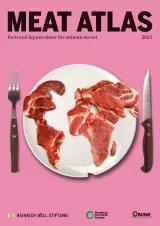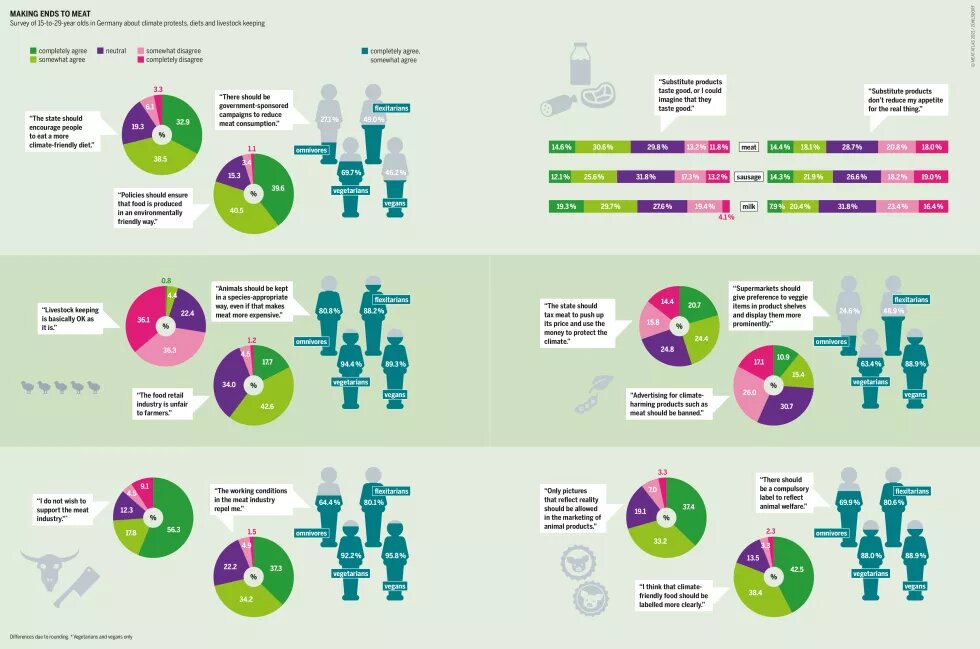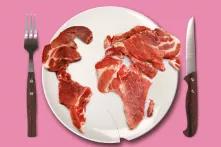
Young people in Germany – the “Fridays for Future generation” – eat less meat than their elders. Their attitudes and habits are likely to steer food consumption and policy in the coming decades. Results of a representative survey.

The consumption of animal products – meat, milk and eggs – in wealthy countries should be reduced to about one-quarter of today’s level. That is the result of a study by leading environmental and nutrition researchers, who have worked out how much animal-based food in our diets would be globally acceptable. The answer: 25 percent of the current average for the developed world, a figure that is a long way off for many Europeans.
Within the European Union, people in Spain currently eat the most meat, followed by those in Portugal and Germany. Slovakians and Bulgarians eat the least. In most EU countries, the consumption of pork and beef is slowly declining, while that of poultry is still rising.
Detailed consumption data are needed to design policies that encourage changes in dietary patterns. Above all, a good understanding of the younger generation is important, as diets are based on habits that generally do not change much as people get older. But such information is scarce. Very few reliable data exist on the number of vegetarians, vegans and flexitarians in various European countries. A survey in 2020 by a vegan food company estimated that some 4.4 percent of the population in Germany has a vegetarian diet. In Austria, it was 3.7 percent; in Portugal, 2.0 percent, with lower numbers reported in the other countries surveyed. These figures are a rough approximation: other studies in individual countries have yielded significantly higher numbers. Some studies in Germany estimate that 6 percent of the country’s population is vegetarian or vegan.
To gain a better understanding of the younger generation, the University of Göttingen in Germany questioned 1,227 young Germans between 15 and 29 years of age in October 2020 about their intake of meat and milk and their motives for consumption. The online survey was representative for Germany in terms of gender, region and education.
The results show that forgoing meat is the trend among adolescents and young adults. Some 10.4 percent of respondents had vegetarian diets, and another 2.3 percent were vegan. Together, just under 13 percent did not eat meat – more than twice as many as in the German population as a whole. The climate movement “Fridays for Future” and related developments have become important drivers for the rise in plant-based eating habits. Around one-third of the vegetarians and vegans in the survey had switched to meat-free diets only in the previous year.
Flexitarians, who make up around 25 percent of young Germans, also contribute to lower meat consumption. They eat meat only occasionally, mainly at social gatherings. When they do, they like to know where the meat comes from. Of those young people who do eat meat, 44 percent say they want to reduce their intake in the future.
Who are vegetarians and vegans? Around 70 percent of respondents in both categories are women. Younger people and students are somewhat more strongly represented. Those interested in technology and skilled trades tend to eat more meat. But on the whole, there are relatively minor differences between sociodemographic groups. Nor did the survey reveal a split between urban and rural areas.
Rather, meat consumption is strongly related to political attitudes. People who eat little meat tend to be more concerned about the environment, and especially about nutrition and animal welfare. Among vegans, 75 percent say they are part of the climate protection movement; almost 50 percent of vegetarians say the same, while only 15 percent of omnivores do so. Some 42 percent of vegetarians, and 63 percent of those who prefer a vegan diet, are committed to fighting food waste, while only 29 percent of meat eaters say they are.
For Germany, the survey reveals that meat consumption is a political issue and not a question of individual tastes. Supporters of vegetarian and vegan diets are clearly more concerned about sustainability and regard themselves as pioneers of sustainable consumption patterns.
The survey found large differences regarding attitudes on the future of livestock farming as a whole. Nearly all – 96 percent – of vegans, and 49 percent of vegetarians, would like to get rid of the practice altogether. For flexitarians it is just 15 percent, and among omnivores just 4 percent. What unites this generation is the rejection of the current form of animal agriculture. Almost no one thinks it is acceptable. “Less but better meat” is the preferred route for the non-vegetarians.
Young people in Germany see the state as having a shared responsibility for sustainable diets. Accordingly, there was clear agreement on many, but not all, of the policy options included in the survey that might support sustainable consumption. The respondents approved of a climate label for food and stricter animal welfare laws, as well as legalizing “dumpster diving” (taking food from waste containers) and making animal welfare labels mandatory. But they were more sceptical of the idea of a compulsory “veggie day”.
On the whole, it seems that many young people are willing to take the path of change. Two options are emerging for the future of livestock: a vegetarian scenario, and animal- and climate-friendly farming. Within European Union policy circles, there is increasing discussion about the links between food consumption and agriculture – which the EU Commission describes as the “farm-to-fork” strategy. But signals to the contrary come from the EU Parliament: in attempts to restrict the product labelling of meat and milk alternatives, for example. It will be interesting to see how far young climate activists get involved in food policy.


